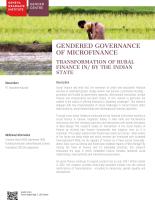Funding organisation: Swiss National Science Foundation, DOC.CH scheme
Timeline: March 2022-September 2025
Budget: CHF 269'370
Keywords: rural, microfinance, state, gender, financialisation
Funding organisation: Swiss National Science Foundation, DOC.CH scheme
Timeline: March 2022-September 2025
Budget: CHF 269'370
Keywords: rural, microfinance, state, gender, financialisation
Since 2019, India has been witness to one of the largest political mobilisations with over 300 million farmers and agricultural labourers protesting against the government’s new farm laws. A key aspect of their distress lies in the financialisation of rural credit. This research will make a contribution towards understanding agrarian distress by exploring the nature and impact of microfinance. The questions here are: how expanding microfinance changes the practices and character of the postcolonial state and how microfinance engenders women’s identities and economic activities, and how women borrowers enact, challenge and resist financialised credit practices. This will be done by studying how the state (and finance) are discursively constituted and the effects that this has on borrowers and their (gendered) social relations. This will place the state in a dialectical tension between structuralist and post-structuralist modes of power.
This research approaches the state across (porous) scales such as the global, national, regional and local to study how the state is constructed, articulated and practiced across scales. This will be done by closely studying documents and conducting fieldwork in New Delhi and West Bengal (the Indian State with highest and expanding concentration of microfinance) to interview women borrowers, debt collectors, state officials and financial actors and elicit the connections and contradictions linking the state and finance in engendering credit practices. This will bring scholarship in political theory of the state in conversation with rich empirical evidence that traverses distinct scales to grasp the state and highlight how gendered social relations are constructed as the state and markets intersect and co-constitute with the phenomenon of microfinance. This research is intended as an in-depth study of rural contexts of a historically indebted region (West Bengal) in order to provide rich empirical data that can allow for analysing the broader processes at work in financialisation of rural credit.
This research has two defining research questions:
In asking these questions together, this research will study:
This research places the state not as a pre-given, unified entity but rather, undergoing changes in its articulations and practices across scales as a developmental state and ‘using’ microfinancial entities to expand into marginalised regions in novel ways. It further posits that expanding markets give shape to the state. The state doesn’t simply ‘retract’ in the face of growing scope of markets, but in fact uses these growing markets to charter new roles for itself. Microfinance provides a relevant intersection for the state, (global) markets and civil society which is becoming the largest source for credit in countries in the Global South such as India.
In studying finance and financialisation, the research will build upon historical materialism in locating capitalist relations of production and finance however in non-deterministic ways that conceive of the state as a Gramscian web of social relations encompassing diverse political claims and relations. In this, finance and economic production are not ensconced in classical Marxist ‘superstructures’ but rather in a version of the state (and finance) conceived around: ‘everyday’ practices and discursive evocation of ‘state’, highlighting the interconnections between practices and ideas. This research is focused on debt and the experiences of debt, and how debt constitutes subjects and their gendered social relations. This will aim to bring to light the power relations within which financialised debt forms are embedded and which they recreate.
In doing so, this research will bring political theory of the state (in relation to markets) in conversation with feminist international political economy (IPE) scholarship to arrive at empirically-based insights on (postcolonial) states. This will bring to bear gender and gendered relations to political theory on states and markets. This will be done through detailed field research conducted in West Bengal.
Kaushal, Tanushree. 2022. The Aestheticisation of Governance in India: The Appeal of Urban Aesthetics in Microfinance. International Development Policy | Revue internationale de politique de développement. 14(1).
Decoloniality and the Politics of the Urban, 27 October 2022.
What is the politics of the divide between the urban and the non-urban (semi-urban, peri-urban and the rural), in contemporary postcolonial and metropolitan contexts, as well as historical colonial contexts? The divide is fundamental to the emergence of modern states as political-economic entities - European, colonial, and developmental. It expresses a politics of concentration/scale, productivity, specialisation, and movement to be governed. Crucially, colonial histories and categories of urban and rural and their relationship to productive and unproductive labour give shape to internal hierarchies of citizenship within states. The politics of these categories manifest themselves in historic rubrics of retribalisation, and contemporary politics of internal labour migration and populist resentment. The divide is of interest as at once a material site, political framework, and historical stage for the making of colonial and postcolonial states – and potentially for the continuation of an “unfinished project of decolonisation”.
With support from the Swiss National Science Foundation.
